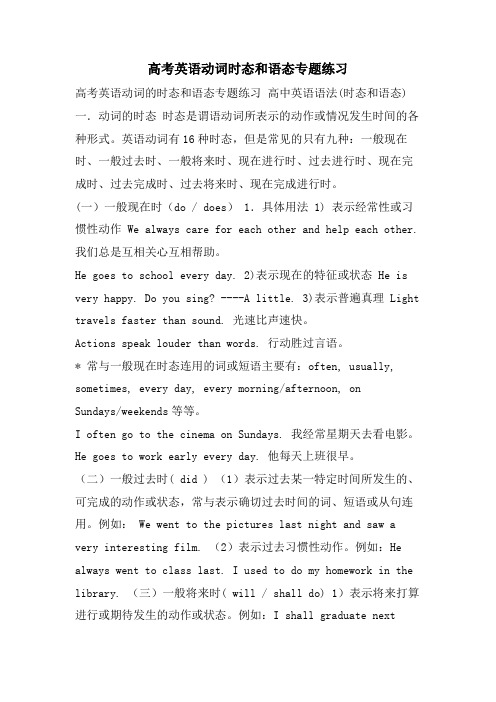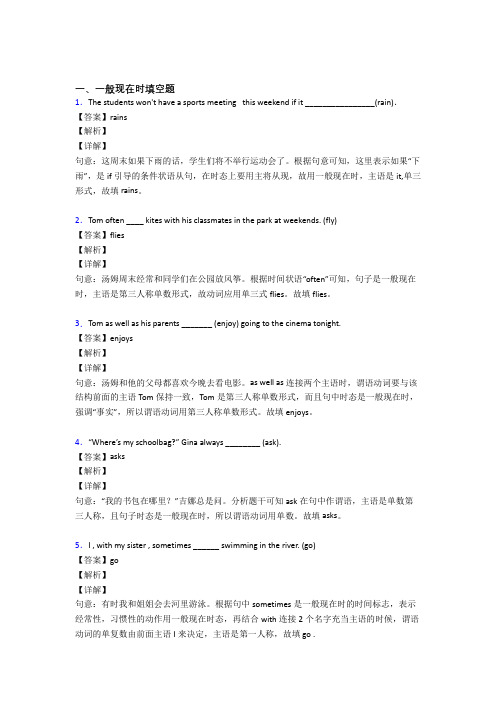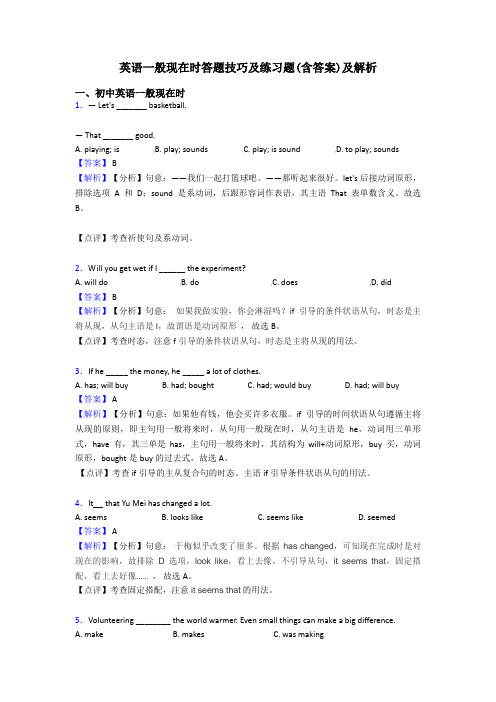英语动词分类+动词时态之一般现在时(含练习)
高考英语动词时态和语态专题练习

高考英语动词时态和语态专题练习高考英语动词的时态和语态专题练习高中英语语法(时态和语态) 一.动词的时态时态是谓语动词所表示的动作或情况发生时间的各种形式。
英语动词有16种时态,但是常见的只有九种:一般现在时、一般过去时、一般将来时、现在进行时、过去进行时、现在完成时、过去完成时、过去将来时、现在完成进行时。
(一)一般现在时(do / does) 1.具体用法 1) 表示经常性或习惯性动作 We always care for each other and help each other. 我们总是互相关心互相帮助。
He goes to school every day. 2)表示现在的特征或状态 He is very happy. Do you sing? ----A little. 3)表示普遍真理 Light travels faster than sound. 光速比声速快。
Actions speak louder than words. 行动胜过言语。
* 常与一般现在时态连用的词或短语主要有:often, usually, sometimes, every day, every morning/afternoon, onSundays/weekends等等。
I often go to the cinema on Sundays. 我经常星期天去看电影。
He goes to work early every day. 他每天上班很早。
(二)一般过去时( did ) (1)表示过去某一特定时间所发生的、可完成的动作或状态,常与表示确切过去时间的词、短语或从句连用。
例如: We went to the pictures last night and saw a very interesting film. (2)表示过去习惯性动作。
例如:He always went to class last. I used to do my homework in the library. (三)一般将来时( will / shall do) 1)表示将来打算进行或期待发生的动作或状态。
(完整版)一般现在时练习题含答案

一、一般现在时填空题1.The students won't have a sports meeting this weekend if it ________________(rain).【答案】rains【解析】【详解】句意:这周末如果下雨的话,学生们将不举行运动会了。
根据句意可知,这里表示如果“下雨”,是if引导的条件状语从句,在时态上要用主将从现,故用一般现在时,主语是it,单三形式,故填rains。
2.Tom often ____ kites with his classmates in the park at weekends. (fly)【答案】flies【解析】【详解】句意:汤姆周末经常和同学们在公园放风筝。
根据时间状语“often”可知,句子是一般现在时,主语是第三人称单数形式,故动词应用单三式flies。
故填flies。
3.Tom as well as his parents _______ (enjoy) going to the cinema tonight.【答案】enjoys【解析】【详解】句意:汤姆和他的父母都喜欢今晚去看电影。
as well as连接两个主语时,谓语动词要与该结构前面的主语Tom保持一致,Tom是第三人称单数形式,而且句中时态是一般现在时,强调“事实”,所以谓语动词用第三人称单数形式。
故填enjoys。
4.“Where’s my schoolbag?” Gina always ________ (ask).【答案】asks【解析】【详解】句意:“我的书包在哪里?”吉娜总是问。
分析题干可知ask在句中作谓语,主语是单数第三人称,且句子时态是一般现在时,所以谓语动词用单数。
故填asks。
5.I , with my sister , sometimes ______ swimming in the river. (go)【答案】go【解析】【详解】句意:有时我和姐姐会去河里游泳。
小学英语五年级一般现在时态总结及练习

一般现在时(1)一般现在时中的be动词:一般用原形:am is aream用于第一人称单数(I);is用于第三人称单数(he she it和其他人名或称谓,如:Ben his sister 等);are用于第二人称单数(you)和所有复数(包括第一人称复数we、第二人称复数you;第三人称复数they和其他复数,如the children 、his parents等)。
(2)一般现在时中的动词:第一种情况:主语是第三人称单数(he she it 和其他,如Helen 、her cousin 等),动词后一般加s或es。
第二种情况:主语不是第三人称单数,动词都用原形。
(4)一般现在时判断依据(如何判断一个句子是一般现在时):△be动词是am、is、are △动词用原形或加s、es△没有时间状语或有usually、often、everyday、sometimes等不是具体的时间一般现在时态练习题一一、写出下列单词的第三人称单数形式。
ask---- meet---- teach---- sit----kick---- look---- listen---- eat----put---- knock---- open---- give----see---- pull---- show---- wash----try---- take---- wake---- shut----count---- share---- post---- play----hide---- seek---- hold---- stand----do---- jump---- stop---- touch----二、写出下列动词的原形。
ends---- rains---- shines---- rises----sets---- sleeps---- gets---- goes----stays---- arrives---- walks---- drives----spends---- forecasts---- fixes---- works----travels---- cleans----三、用所给动词的一般现在时填空。
英语一般现在时答题技巧及练习题(含答案)及解析

英语一般现在时答题技巧及练习题(含答案)及解析一、初中英语一般现在时1.— Let's _______ basketball.— That _______ good.A. playing; isB. play; soundsC. play; is soundD. to play; sounds【答案】 B【解析】【分析】句意:——我们一起打篮球吧。
——那听起来很好。
let's后接动词原形,排除选项A和D;sound是系动词,后跟形容词作表语,其主语That表单数含义。
故选B。
【点评】考查祈使句及系动词。
2.Will you get wet if I ______ the experiment?A. will doB. doC. doesD. did【答案】 B【解析】【分析】句意:如果我做实验,你会淋湿吗?if引导的条件状语从句,时态是主将从现,从句主语是 I,故谓语是动词原形,故选B。
【点评】考查时态,注意f引导的条件状语从句,时态是主将从现的用法。
3.If he _____ the money, he _____ a lot of clothes.A. has; will buyB. had; boughtC. had; would buyD. had; will buy【答案】 A【解析】【分析】句意:如果他有钱,他会买许多衣服。
if引导的时间状语从句遵循主将从现的原则,即主句用一般将来时,从句用一般现在时,从句主语是he,动词用三单形式,have有,其三单是has,主句用一般将来时,其结构为will+动词原形,buy买,动词原形,bought是buy的过去式,故选A。
【点评】考查if引导的主从复合句的时态。
主语if引导条件状语从句的用法。
4.It that Yu Mei has changed a lot.A. seemsB. looks likeC. seems likeD. seemed【答案】 A【解析】【分析】句意:于梅似乎改变了很多。
(完整版)一般现在时练习题含答案

一、一般现在时填空题1.Michelle isn’t America’s first lady now, so she _________ (not live) in the White House any more.【答案】doesn’t live【解析】【详解】句意:米歇尔现在不是美国第一夫人,所以她不能再住在白宫。
根据句中时间标志now现在可知,用现在时态,分析句子结构,缺少谓语动词,主语是she,谓语动词用第三人称单数,故答案是doesn’t live2.Lee ________ (have) a soccer ball. Do you have one?【答案】has【解析】【详解】句意:李有一个足球。
你有吗?根据“Do you have one?”可知,时态是一般现在时,Lee作主语,谓语动词用三单形式,故填has。
3.The English story ________(sound)very interesting. We all like it.【答案】sounds【解析】【分析】【详解】句意:这个英语故事听起来很有趣,我们所有人都喜欢它。
sound“听起来”,根据“We all like it”可知,用一般现在时,主语为“The English story”,故填sounds。
4.Not only the twins but also Tom always ________(mix)the sugar with coffee together【答案】mixes【解析】【详解】句意:不仅双胞胎而且Tom总是把糖和咖啡混在一起。
当not only…but also…连接两个主语时,谓语动词采取就近一致原则,即谓语动词要和与其最近的主语保持人称和数的一致,由“always”可知,时态是一般现在时,Tom是第三人称单数,所以用动词mix“混合”的第三人称单数mixes,故填mixes。
一般现在时练习题(含答案)

一、一般现在时填空题1.Everything ________ (go) well. I feel happy.【答案】goes【解析】【详解】句意:一切进展得很顺利,我很高兴。
go“去”,动词,go well“进展顺利”,固定词组;由后半句“I feel happy.”可知句子时态为一般现在时,主语Everything为不定代词,因此谓语动词要用第三人称单数形式goes;故填goes。
2.Miss Wang says Learning English ___________ (requi re) action, or we’ll get nothing.【答案】requires【解析】【详解】句意:王小姐说学英语需要行动,否则我们什么也学不到。
本句是宾语从句,时态是一般现在时,主句是Miss Wang says;从句是Learning English ___________ (require) action, or we’ll get nothing。
从句是主语Learning English是动名词,谓语动词用单数;结合句意和所给单词可知答案是requires。
3.Liu Xiang _____________ (run) very fast and I want to be a man like him.【答案】runs【解析】【详解】句意:刘翔跑得非常快,我想成为像他一样的人。
根据空缺处所在的句子是客观事实,所以时态是一般现在时,主语“Liu Xiang”是第三人称单数,所以用动词run“跑”的第三人称单数runs,故填runs。
4.Sally ________ (walk) to school with her classmates every day.【答案】walks【解析】【详解】句意:Sally每天和她同学步行去上学。
根据“every day”可知,时态为一般现在时;主语“Sally”是第三人称单数,谓语动词要用单数形式。
江苏中考英语复习之初中英语主要时态系列(一)—— 一般现在时讲解及练习
一、一般现在时有三种形式1. 谓语是be(am/is/are)的一般现在时。
①肯定形式:主语+be+表语(形容词、名词充当表语)。
I am hungry.You are beautiful.He is a doctor.②否定形式:主语+be+not+表语(形容词、名词充当表语)。
I am not hungry.You aren't beautiful.He isn't a doctor.③一般疑问句形式:Be+主语+表语(形容词、名词充当表语)? 肯定回答:Yes,主语+be. 否定回答:No, 主语+ be+not.—Are you hungry?—Yes,I am./No,I'm not.—Is he a doctor?—Yes, he is./No, he isn,t.④特殊疑问句形式:特殊疑问词+Be开头的一般疑问句?—What is he?—He is a doctor.注意:be要随着主语变。
2. 谓语动词是实义动词(及物动词或不及物动词)的一般现在时。
①肯定形式:“主语+及物动词+宾语”或“主语+不及物动词”。
She has a little brother.她有一个弟弟。
The sun rises in the east.太阳从东方升起。
②否定形式:“主语+don't/doesn't+及物动词+宾语”或“主语+don't/doesn't+不及物动词”。
She doesn't have a little brother.她没有弟弟。
I don't eat every morning.我每天早晨都不吃饭。
③一般疑问句形式:“Do/Does+主语+及物动词原形+宾语”或“Do/Does+主语+不及物动词原形”。
肯定回答:Yes,主语+do/does. 否定回答是:No, 主语+ don't/doesn't.—Do you eat every morning?—Yes, I do./No, I don't.—Does she have a little brother?—Yes, she does./No, she doesn't.④特殊疑问句:特殊疑问词+do/does开头的一般疑问句?What do you like?When do you go to school?注意:根据主语确定用do还是does。
(完整版)一般现在时练习题含答案
一、一般现在时填空题1.My best friend and I _______(be not)in the same school, we meet at weekends.【答案】are not##aren't【解析】【详解】句意:我最好的朋友和我不在同一所学校,我们在周末见面。
根据题干,可知时态是一般现在时,主语My best friend and I是复数形式,be动词用are ,否定形式在be动词后加not,故填are not/aren't。
2.The experiment he devoted himself to ________ a perfect success. (prove)【答案】proved##proves【解析】【详解】句意:他致力于的实验证明是圆满成功的。
此处在句中作谓语,“证明”这一动作发生在过去或现在均可,主语是The experiment,动词使用动词过去式或动词三单。
故填proved/proves。
3.Bill’s father _______ (have) two telephone numbers.【答案】has【解析】【详解】句意:比尔的爸爸有两个电话号码。
根据主语Bill’s father单三,谓语动词用单数形式;故填has4.— _____ she ____ (do) her homework every day?—Yes, she does.【答案】 Does do【解析】【详解】句意:——她每天做作业吗?——是的,她做。
所给词do为实义动词“做”,由于本句要求改为一般疑问句,且主语she为单数第三人称,故用选择助动词does来帮助do完成疑问句,助动词does后的动词要用原形形式,故答案为Does;do。
5.Tim usually ________(get)up at six o’clock.【答案】gets【解析】【详解】句意:Tim通常六点钟起床。
(完整版)一般现在时练习题含答案
一、一般现在时填空题1.The little girl ________ (look) like her father. Now, she ________ (look) at the photos of her family.【答案】 looks is looking【解析】【详解】句意:这个小女孩长得像她爸爸。
现在她正在看她的家庭照片。
由语境可知,第一句话表示女孩的外貌特征,用一般现在时,主语是第三人称单数,谓语动词look加s;第二句根据Now“现在”可知,表示现在正在做某事,时态用现在进行时be(am/is/are)+doing的结构,主语是第三人称单数,be动词用is,look变现在分词加ing。
故填looks;is looking。
2.Lee ________ (have) a soccer ball. Do you have one?【答案】has【解析】【详解】句意:李有一个足球。
你有吗?根据“Do you have one?”可知,时态是一般现在时,Lee作主语,谓语动词用三单形式,故填has。
3.Everyone ________ (be) h ere, let’s begin our class.【答案】is【解析】【详解】句意:每个人都在这,让我们开始上课。
句子是一般现在时,不定代词everyone作主语,be动词用单数形式is,故填is。
4.My brother always ________ (pay) by apps on his mobile phone when he buys things.【答案】pays【解析】【详解】句意:我弟弟买东西的时候经常用手机里的应用程序支付。
根据always可知,此句为一般现在时,主语My brother是第三人称单数,因此谓语动词用单数,pay的第三人称单数形式为pays。
故填pays。
5.Mike often ________ (play) the violin in the evening.【答案】plays【解析】【详解】句意:Mike经常在晚上拉小提琴。
小学英语语法时态归纳及练习(含答案解析)
英语时态归纳一、一般现在时:标志词:often(经常) sometimes(有时) always(总是) usually(通常) never(从不) every(每一)行为动词词型变化形式:一般现在时动词只有第三人称有词形变化;其他人称(第一人称:I, we;第二人称:you;第三人称复数:they、my friends)动词均用原形。
当主语是第三人称单数时,一般动词在一般现在时句子中的变化规律:1、多数在动词后加s:play—plays like—likes ,2、以s,x,sh,ch,o结尾的动词加es wash–washes catch–catches do–does3、以辅音字母加y结尾,把y改i再加es fly—flies study—studies4、以元音字母加y结尾,直接加s buy – buys5、不规则变化have—has一般现在时基本用法功能1.表示事物或人物的特征、状态。
如:The sky is blue.天空是蓝色的。
2.表示经常性或习惯性的动作。
如:I get up at six every day.我每天六点起床。
3.表示客观现实。
如:The earth goes around the sun.地球绕着太阳转。
The earth is round.构成1. be动词:主语+be(am,is,are)+其它。
如:I am a boy.我是一个男孩。
2.行为动词:主语+行为动词(+其它)。
如:We study English.我们学习英语。
句型肯定句:A.be动词:主语+ be + 其它成分He is a worker.B.行为动词:主语+动词(注意人称变化) +其它成分We like the little cat.否定句:A.be动词:主语+ be + not+其它成分They are not students.B.行为动词:主语+助动词(do/does) + not+动词原形+其它成分We don’t like the little cat.一般疑问句:A.be动词:Am / Is /Are +主语+ 其它成分Are you a teacher? Yes, I am. / No, I am not.Are they students of your school. Yes, they are / No they aren’t.B.行为动词:助动词(Do/Does)+主语+动词原形+ 其它成分Do you like it? Yes, I do. / No. I don’t .Does he(she) like it? Yes, he( she )does. / No, he ( she )doesn’t.特殊疑问句:疑问词+ 一般疑问句A.be动词:How many students are there in your school?B.行为动词:What do you usually do on Sunday?一般现在时动词be和have的变化形式1.动词Be 叫连系动词, 用法:第一人称单数用am,第三人称单数用is,其它人称用are。
- 1、下载文档前请自行甄别文档内容的完整性,平台不提供额外的编辑、内容补充、找答案等附加服务。
- 2、"仅部分预览"的文档,不可在线预览部分如存在完整性等问题,可反馈申请退款(可完整预览的文档不适用该条件!)。
- 3、如文档侵犯您的权益,请联系客服反馈,我们会尽快为您处理(人工客服工作时间:9:00-18:30)。
动词分类+一般现在时(一)一、动词分类动词是英语词类中最重要的一种。
动词按其词义和在句中的作用可分为:及物动词实义动词不及物动词系动词动词情态动词助动词1.实义动词(有实际意义的动词,可在句中独立做谓语):及物动词可以直接加宾语(study/ learn/ eat/ drink/ wash…)不及物动词不能直接加宾语,但是不及物动词+介词+宾语(常见动词有:listen to/ look at/ speak to…)2.系动词+形容词1)感官动词:feel; sound; smell; taste; look +形容词(当look 做实义动词讲时为不及物动词)2)be/ seem+形容词3)表变化的词:get/ turn/ become/ go+形容词(get/ turn/ go当实义动词讲是意思分别为:得到/ 轮流/ 去、走)3.助动词无实际意义,在句中不能独立做谓语,have/ do 既可以做助动词也可以做实义动词(先做简单了解,之后讲动词时态时会经常见到)eg1. I have a bike. (have是实义动词)eg2. They have gone to Beijing. (have是助动词)eg3. I do my homework everyday. (do 是实义动词)eg4. I do like English. (do 是助动词)4.情态动词(情态动词在句中不可独立做谓语)常见情态动词:may, might, can, could, must, shall, should, will, would, had better, need(此处不做重点,之后会做情态动词专题)二.一般现在时的用法1. 基本用法表示经常的或习惯性的动作,常与表示频度的副词:always、usually、often、sometimes、seldom、never等以及时间状语:every day、every morning、every afternoon、every evening等连用。
Eg: He often goes swimming in summer.I usually go to school at 7 every morning.2. 拓展用法①表示现在的状态。
Eg: My father is at work. He is very busy.The boy is twelve.②表示主语具备的性格、特征和能力等。
Eg: My sister is very clever.I like singing, but I can’t sing very well.③表示客观真理,客观存在,自然现象。
Eg: The earth moves around the sun.Shanghai lies in the east of China.④表示按计划或安排好的,或将要发生的动作,可用一般现在时表将来。
但只限于start,begin,leave,go,come,arrive,return等。
Eg: The train leaves at six tomorrow morning.⑤在时间、条件状语从句中,用一般现在时表示将来时的动作。
Eg: If id doesn't rain tomorrow, we'll go to the park.三.一般现在时的结构㈠含Be动词的一般现在时的结构肯定句:主语+ am/is/are + 其他成分.(注意be动词的选取)否定句:主语+ am/is/are + not + 其他成分.一般疑问句:Am/Is/Are + 主语+ 其他成分?(注意疑问句的回答)Eg: I am a student./ She is a teacher. / We are doctors.I am not a student. / She is not a teacher. / We are not doctors.Are you a student? / Is she a teacher? / Are you doctors?(注意主语是第一人称代词在疑问句中的变化)㈡含实义动词的一般现在时的结构1. 动词第三人称单数形式的变化规则特殊:have的单数形式是has2. 基本结构①当主语是I,you,we,they等代词及表示复数概念的名词做主语时:肯定句:主语+ 动词原形+ 其他成分.否定句:主语+ don't + 动词原形+ 其他成分.一般疑问句:Do + 主语+ 动词原形+ 其他成分?(注意疑问句的回答)Eg: They study very hard.They don't study very hard.Do they study very hard?②当主语是she,he,it等代词及表示单数概念的名词作主语时:肯定句:主语+ 动词的第三人称单数+ 其他成分.否定句:主语+ doesn't + 动词原形+ 其他成分.一般疑问句:Does + 主语+ 动词原形+ 其他成分?(注意疑问句的回答)Eg: She gets up at 6 o'clock every morning.She doesn't get up at 6 o'clock every morning.Does she get up at 6 o'clock every morning?课堂练习:一、写出下列动词的第三人称单数。
1. eat grow see open wear2. push wash pass fix watch catch go do3. try fly carry worry cryStudy hurry4. say stay play5. have be二、用所给动词的一般现在时填空。
1. Peter (go) to school every day. He (study) very hard.2. The moon always (move) around the earth.3. you often (water) these flowers?4. They (be) doctors. They (not have) a holiday on Sundays.5. Mary (do) her homework after school. She (not watch) TV.6. She sometimes (sing and dance) happily.三、用be动词或do的适当形式填空。
1. --- your teachers work hard?---Yes, they .2. ---What they every day?---They their homework.3. --- the boy clever?---Yes, he . He his homework by himself.4. --- I tall and handsome?---Yes, you .5. ---How often she comb her hair?---She combs her hair twice a day.四、单选选择。
1. ---_______ he _______ to the park at 6:30 in the morning?---No, he ________.A. Does; goes; doesB. Does; go; doesn’tC. Does; go; does2. She usually _______ her friends. They often _______ tea.A. see; drinkB. sees; drinksC. sees; drink3. ---_______ your pen--pal _______ diving?---No, he _______. He ________ writing stories.A. Does; like; doesn’t; likeB. Does; likes; doesn’t; likeC. Do; like; don’t; likes4. ---________ you ________ coffee? ---Yes, I ________.A. Do; like; doB. Did; like; didC. Are; like; am5. She _______ tea, but he _______.A. likes; doesn’tB. like; don’tC. like; doesn’t课后练习:I. 写出下列动词的第三人称单数形式。
1. play________2. fly ________3. plant ________4. drink_________5. play________6. go_________7. make _________8. do__________9. dance________ 10. worry_________ 11. ask_________ 12. taste_________ 13. eat_________ 14. draw_________ 15. put_________ 16. throw_________ 17. say_________ 18. pass_________ 19. come_________ 20. sit _________II. 按要求改写句子。
1. It is sunny today.否定句:_____________________________________________一般疑问句:_________________________________________肯定、否定回答:_____________________________________2. All the students like singing.否定句:_____________________________________________一般疑问句:__________________________________________肯定、否定回答:______________________________________3. We can sing and dance.否定句:____________________________________________一般疑问句:________________________________________肯定、否定回答:____________________________________4 . John comes from Canada.否定句:______________________________________________一般疑问句:__________________________________________肯定、否定回答:______________________________________III单选选择。
